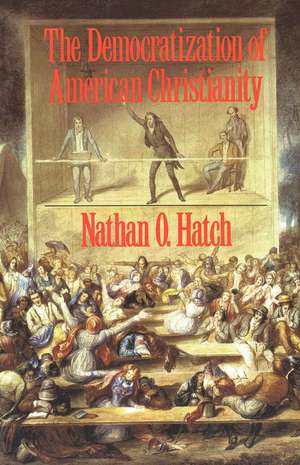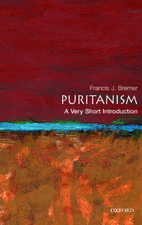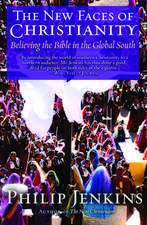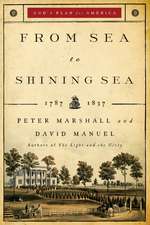The Democratization of American Christianity
Autor Nathan O. Hatchen Limba Engleză Paperback – 23 ian 1991
A provocative reassessment of religion and culture in the early days of the American republic
"The so-called Second Great Awakening was the shaping epoch of American Protestantism, and this book is the most important study of it ever published."—James Turner, Journal of Interdisciplinary History
Winner of the John Hope Franklin Publication Prize, the Society for Historians of the Early American Republic book prize, and the Albert C. Outler Prize
In this provocative reassessment of religion and culture in the early days of the American republic, Nathan O. Hatch argues that during this period American Christianity was democratized and common people became powerful actors on the religious scene. Hatch examines five distinct traditions or mass movements that emerged early in the nineteenth century—the Christian movement, Methodism, the Baptist movement, the black churches, and the Mormons—showing how all offered compelling visions of individual potential and collective aspiration to the unschooled and unsophisticated.
"The most powerful, informed, and complex suggestion yet made about the religious, political, and psychic 'opening' of American life from Jefferson to Jackson. . . . Hatch's reconstruction of his five religious mass movements will add popular religious culture to denominationalism, church and state, and theology as primary dimensions of American religious history."—Robert M. Calhoon, William and Mary Quarterly
"Hatch's revisionist work asks us to put the religion of the early republic in a radically new perspective. . . . He has written one of the finest books on American religious history to appear in many years."—James H. Moorhead, Theology Today
"The so-called Second Great Awakening was the shaping epoch of American Protestantism, and this book is the most important study of it ever published."—James Turner, Journal of Interdisciplinary History
Winner of the John Hope Franklin Publication Prize, the Society for Historians of the Early American Republic book prize, and the Albert C. Outler Prize
In this provocative reassessment of religion and culture in the early days of the American republic, Nathan O. Hatch argues that during this period American Christianity was democratized and common people became powerful actors on the religious scene. Hatch examines five distinct traditions or mass movements that emerged early in the nineteenth century—the Christian movement, Methodism, the Baptist movement, the black churches, and the Mormons—showing how all offered compelling visions of individual potential and collective aspiration to the unschooled and unsophisticated.
"The most powerful, informed, and complex suggestion yet made about the religious, political, and psychic 'opening' of American life from Jefferson to Jackson. . . . Hatch's reconstruction of his five religious mass movements will add popular religious culture to denominationalism, church and state, and theology as primary dimensions of American religious history."—Robert M. Calhoon, William and Mary Quarterly
"Hatch's revisionist work asks us to put the religion of the early republic in a radically new perspective. . . . He has written one of the finest books on American religious history to appear in many years."—James H. Moorhead, Theology Today
Preț: 249.34 lei
Nou
Puncte Express: 374
Preț estimativ în valută:
47.72€ • 49.63$ • 39.39£
47.72€ • 49.63$ • 39.39£
Carte disponibilă
Livrare economică 22 martie-05 aprilie
Preluare comenzi: 021 569.72.76
Specificații
ISBN-13: 9780300050608
ISBN-10: 0300050607
Pagini: 326
Ilustrații: 12 b-w illus.
Dimensiuni: 156 x 235 x 23 mm
Greutate: 0.49 kg
Editura: Yale University Press
Colecția Yale University Press
ISBN-10: 0300050607
Pagini: 326
Ilustrații: 12 b-w illus.
Dimensiuni: 156 x 235 x 23 mm
Greutate: 0.49 kg
Editura: Yale University Press
Colecția Yale University Press
Recenzii
"Professor Hatch's amply documented study captures a wide range of the many-sided demands for equality and freedom that have characterized American Protestant Christianity, and the disdain for deference and patronage—nowhere more so than among black preachers. . . . The Democratization of American Christianity constitutes vital reading for those who would understand just what experience of the United States has done to Christian belief and practice."—Bryan Wilson, Times Literary Supplement
"This study sheds important new light on early American social history. It extends a central theme that historians have used to explain political history into a new arena. It offers fresh ideas about the development of the evangelical movement that are important for all students of history to understand. In short, this book makes an important new contribution to social history."—Richard G. Miller, History: Reviews of New Books
"A superb treatment of Christianity during the volatile period of the early American Republic, which every student of American religious history must read, savor, and incorporate into his or her thinking of American religion and culture."—Timothy E. Fulop, Journal of the American Academy of Religion
"A standard reference on American religious history."—Michael Cromartie, First Things
"Rarely do works of scholarship deserve as much attention as this one. The so-called Second Great Awakening was the shaping epoch of American Protestantism, and this book is the most important study of it ever published. . . . Hatch's account of the inner dynamic of American Protestantism is not merely plausible but compelling. We will never again look at the Second Great Awakening—or at the history of religion in America—with the same eyes."—James Turner, Journal of Interdisciplinary History
"A seminal and revisionist book. . . . Hatch's paradigm has persuasive power because it seems to explain what is still happening in American religious life. . . . His book is . . . an important corrective to prevailing views and a marvelous impetus to further investigation."—Dewey D. Wallace, Jr., American Studies International
"This volume adds a crucial element to the narrative of the emergence of American culture after the revolution and, like all good revisions, should open the door to a new and necessary era of investigation."—John G. Stackhouse, Jr., Journal of Religion
"Hatch's detailed analysis of the life of the churches during the formative years of the republic is on the whole thoroughly convincing."—Winthrop S. Hudson, Church History
"A landmark in the interpretation of early American religion. . . . His call to place populist religion at the center of the Second Great Awakening is categorically correct and long overdue. This volume provides a compelling new vision of religion in the early republic and invites scholars to a rich interpretive discourse certain to reshape its historiography."—Stephen A. Marini, American Historical Review
"Not only is Nathan O. Hatch's Democratization of American Christianity thoroughly researched and a pleasure to read, it is also one of the most important books on U. S. religious history to be published in the last decade. . . . The Democratization of American Christianity is a major achievement. Every teacher and student of early U. S. history will profit greatly from reading this splendid volume."—Curtis D. Johnson, The Historian
"This superbly written volume is an intellectual history. . . . This splendid book will surely be widely quoted—and should be. It is a must-read for evangelicals and for all students of modern Christianity. As a classic, it will shape future discussion."—David W. Hall, Calvin Theological Journal
"[A] magnificent new history of democratic evangelicism in the New Republic."—Robert M. Calhoon, The Southern Friend, Journal of the North Carolina Friends Historical Society
"Nathan Hatch presents an excellent and provocative account of the triumph of popular religion in the antebellum republic. . . . Valuable material for students of nineteenth-century prose."—J. Lawrence Brasher, Nineteenth Century Prose
"Put this superb book on your must-read list. Nathan O. Hatch has written a fascinating, almost hagiographical history that seeks to canonize some forgotten or overlooked religious leaders who were immensely popular in early nineteenth-century America. Hatch’s broad theme is empowerment. He demonstrates beautifully through biography, social history, rhetorical analysis, the study of hymn lyrics and the history of thought how various Protestant movements in nineteenth-century America transformed largely powerless individuals into powerful religious leaders. The scope of his argument is extraordinary, his prose accessible, his theme vital. This is a relevant yet historically grounded work. . . . This timely history will challenge and enrich one’s understanding of both past and present."—Jon Pahl, The Christian Century
"Analyzing five distinct religious movements which began in the early nineteenth century (the Christian movement, Methodism, the Baptists, black churches, and Mormonism), Hatch concludes that in the decades following the Revolution, American society’s increased emphasis on egalitarian values extended into the religious consciousness of the nation. Newer religious movements offered a ’religious populism’ that stressed greater individualism."—Studies in the American Renaissance
"This fine book presents a new and exciting picture of American religion. . . . The focus is new, the story is new. Also because the research is fresh, imaginative, and insightful, the result is striking in its impact. . . . After Nathan Hatch’s book, it will be possible, and increasingly plausible, to interpret an enormous amount of what we see around us in the 1990s in terms of the powerful movement that he describes: the democratization of American Christianity."—Edwin S. Gaustad, Catholic Historical Review
"One of Hatch’s finest contributions is to show the populist insurgency as a supply-side religion. . . . Hatch delicately balances critique and commendation of his subjects."—James D. Bratt, Books and Religion
"The most powerful, informed, and complex suggestion yet made about the religious, political, and psychic 'opening' of American life from Jefferson to Jackson, a suggestion with an overlay of speculation about the widest ideological ramifications of that opening. . . . Unforgettable images of preaching, religious gathering, and uncannily strong, vulnerable human faces."—Robert M. Calhoon, William and Mary Quarterly
"A first-rate book that offers a fresh angle of vision on more than one dimension of American religion and culture."—E. Brooks Holifield, Journal of American History
"Make no mistake about the importance of this book. . . . [Hatch] has located the pulse of post-revolutionary religious culture."—Christine Leigh Heyrman, New England Quarterly
"Masterfully argues that ’the theme of democratization is central to understanding the development of American Christianity’ and that ’the years of the early republic are the most crucial in revealing that process.'"—Don Donahue, Religious Studies Review
"This is one of those few books that lives up to the testimonials of its dust jacket: it is indeed a 'deeply researched' and 'superbly written' 'landmark study' that is possibly the 'best book on religion in the early Republic'. . . . Hatch’s book ought to encourage instructors of U. S. history survey courses to revise some of their lecture notes in explaining the meaning of democracy in the early Republic, but that may be too much to expect."—Donald G. Mathews, Journal of Southern History
"This is [Hatch’s] groundbreaking study of the transformation of American Christianity from the American Revolution through the first half of the nineteenth century."—Theology Digest
"Offers an extraordinarily significant reformulation of religious experience in the first half of the nineteenth century. . . . The present volume represents a giant step forward in the fleshing out of American religious history and will be an absolutely essential work for any serious reflection in the field."—Robert H. Abzug, Journal of the Early Republic
"Nathan O. Hatch . . . offer[s] fresh insights and substantial documentation regarding the pervasive religiosity of the American people. . . . [This] volume [is] timely and valuable."—Robert S. Michaelson, Los Angeles Times
Winner of the Society for Historians of the Early American Republic’s annual book prize for the best book in the history of the early republic (1789-1850) published in 1989
Selected for the distinction of best books in American studies published in 1989 by the American Studies Association
Winner of the 1988 Albert C. Outler Prize in Ecumenical Church History given by the American Society of Church History
Winner of the American Studies Association distinction for best books in American studies published in 1989
Winner of a Christianity Today 1990-91 Critics’ Choice Award
"This is the best book on religion in the early Republic that has ever been written."—Gordon S. Wood, Brown University
"This deeply researched, superbly written book goes to the very heart of American religious and cultural development."—Jon Butler, Yale University
"This study sheds important new light on early American social history. It extends a central theme that historians have used to explain political history into a new arena. It offers fresh ideas about the development of the evangelical movement that are important for all students of history to understand. In short, this book makes an important new contribution to social history."—Richard G. Miller, History: Reviews of New Books
"A superb treatment of Christianity during the volatile period of the early American Republic, which every student of American religious history must read, savor, and incorporate into his or her thinking of American religion and culture."—Timothy E. Fulop, Journal of the American Academy of Religion
"A standard reference on American religious history."—Michael Cromartie, First Things
"Rarely do works of scholarship deserve as much attention as this one. The so-called Second Great Awakening was the shaping epoch of American Protestantism, and this book is the most important study of it ever published. . . . Hatch's account of the inner dynamic of American Protestantism is not merely plausible but compelling. We will never again look at the Second Great Awakening—or at the history of religion in America—with the same eyes."—James Turner, Journal of Interdisciplinary History
"A seminal and revisionist book. . . . Hatch's paradigm has persuasive power because it seems to explain what is still happening in American religious life. . . . His book is . . . an important corrective to prevailing views and a marvelous impetus to further investigation."—Dewey D. Wallace, Jr., American Studies International
"This volume adds a crucial element to the narrative of the emergence of American culture after the revolution and, like all good revisions, should open the door to a new and necessary era of investigation."—John G. Stackhouse, Jr., Journal of Religion
"Hatch's detailed analysis of the life of the churches during the formative years of the republic is on the whole thoroughly convincing."—Winthrop S. Hudson, Church History
"A landmark in the interpretation of early American religion. . . . His call to place populist religion at the center of the Second Great Awakening is categorically correct and long overdue. This volume provides a compelling new vision of religion in the early republic and invites scholars to a rich interpretive discourse certain to reshape its historiography."—Stephen A. Marini, American Historical Review
"Not only is Nathan O. Hatch's Democratization of American Christianity thoroughly researched and a pleasure to read, it is also one of the most important books on U. S. religious history to be published in the last decade. . . . The Democratization of American Christianity is a major achievement. Every teacher and student of early U. S. history will profit greatly from reading this splendid volume."—Curtis D. Johnson, The Historian
"This superbly written volume is an intellectual history. . . . This splendid book will surely be widely quoted—and should be. It is a must-read for evangelicals and for all students of modern Christianity. As a classic, it will shape future discussion."—David W. Hall, Calvin Theological Journal
"[A] magnificent new history of democratic evangelicism in the New Republic."—Robert M. Calhoon, The Southern Friend, Journal of the North Carolina Friends Historical Society
"Nathan Hatch presents an excellent and provocative account of the triumph of popular religion in the antebellum republic. . . . Valuable material for students of nineteenth-century prose."—J. Lawrence Brasher, Nineteenth Century Prose
"Put this superb book on your must-read list. Nathan O. Hatch has written a fascinating, almost hagiographical history that seeks to canonize some forgotten or overlooked religious leaders who were immensely popular in early nineteenth-century America. Hatch’s broad theme is empowerment. He demonstrates beautifully through biography, social history, rhetorical analysis, the study of hymn lyrics and the history of thought how various Protestant movements in nineteenth-century America transformed largely powerless individuals into powerful religious leaders. The scope of his argument is extraordinary, his prose accessible, his theme vital. This is a relevant yet historically grounded work. . . . This timely history will challenge and enrich one’s understanding of both past and present."—Jon Pahl, The Christian Century
"Analyzing five distinct religious movements which began in the early nineteenth century (the Christian movement, Methodism, the Baptists, black churches, and Mormonism), Hatch concludes that in the decades following the Revolution, American society’s increased emphasis on egalitarian values extended into the religious consciousness of the nation. Newer religious movements offered a ’religious populism’ that stressed greater individualism."—Studies in the American Renaissance
"This fine book presents a new and exciting picture of American religion. . . . The focus is new, the story is new. Also because the research is fresh, imaginative, and insightful, the result is striking in its impact. . . . After Nathan Hatch’s book, it will be possible, and increasingly plausible, to interpret an enormous amount of what we see around us in the 1990s in terms of the powerful movement that he describes: the democratization of American Christianity."—Edwin S. Gaustad, Catholic Historical Review
"One of Hatch’s finest contributions is to show the populist insurgency as a supply-side religion. . . . Hatch delicately balances critique and commendation of his subjects."—James D. Bratt, Books and Religion
"The most powerful, informed, and complex suggestion yet made about the religious, political, and psychic 'opening' of American life from Jefferson to Jackson, a suggestion with an overlay of speculation about the widest ideological ramifications of that opening. . . . Unforgettable images of preaching, religious gathering, and uncannily strong, vulnerable human faces."—Robert M. Calhoon, William and Mary Quarterly
"A first-rate book that offers a fresh angle of vision on more than one dimension of American religion and culture."—E. Brooks Holifield, Journal of American History
"Make no mistake about the importance of this book. . . . [Hatch] has located the pulse of post-revolutionary religious culture."—Christine Leigh Heyrman, New England Quarterly
"Masterfully argues that ’the theme of democratization is central to understanding the development of American Christianity’ and that ’the years of the early republic are the most crucial in revealing that process.'"—Don Donahue, Religious Studies Review
"This is one of those few books that lives up to the testimonials of its dust jacket: it is indeed a 'deeply researched' and 'superbly written' 'landmark study' that is possibly the 'best book on religion in the early Republic'. . . . Hatch’s book ought to encourage instructors of U. S. history survey courses to revise some of their lecture notes in explaining the meaning of democracy in the early Republic, but that may be too much to expect."—Donald G. Mathews, Journal of Southern History
"This is [Hatch’s] groundbreaking study of the transformation of American Christianity from the American Revolution through the first half of the nineteenth century."—Theology Digest
"Offers an extraordinarily significant reformulation of religious experience in the first half of the nineteenth century. . . . The present volume represents a giant step forward in the fleshing out of American religious history and will be an absolutely essential work for any serious reflection in the field."—Robert H. Abzug, Journal of the Early Republic
"Nathan O. Hatch . . . offer[s] fresh insights and substantial documentation regarding the pervasive religiosity of the American people. . . . [This] volume [is] timely and valuable."—Robert S. Michaelson, Los Angeles Times
Winner of the Society for Historians of the Early American Republic’s annual book prize for the best book in the history of the early republic (1789-1850) published in 1989
Selected for the distinction of best books in American studies published in 1989 by the American Studies Association
Winner of the 1988 Albert C. Outler Prize in Ecumenical Church History given by the American Society of Church History
Winner of the American Studies Association distinction for best books in American studies published in 1989
Winner of a Christianity Today 1990-91 Critics’ Choice Award
"This is the best book on religion in the early Republic that has ever been written."—Gordon S. Wood, Brown University
"This deeply researched, superbly written book goes to the very heart of American religious and cultural development."—Jon Butler, Yale University













